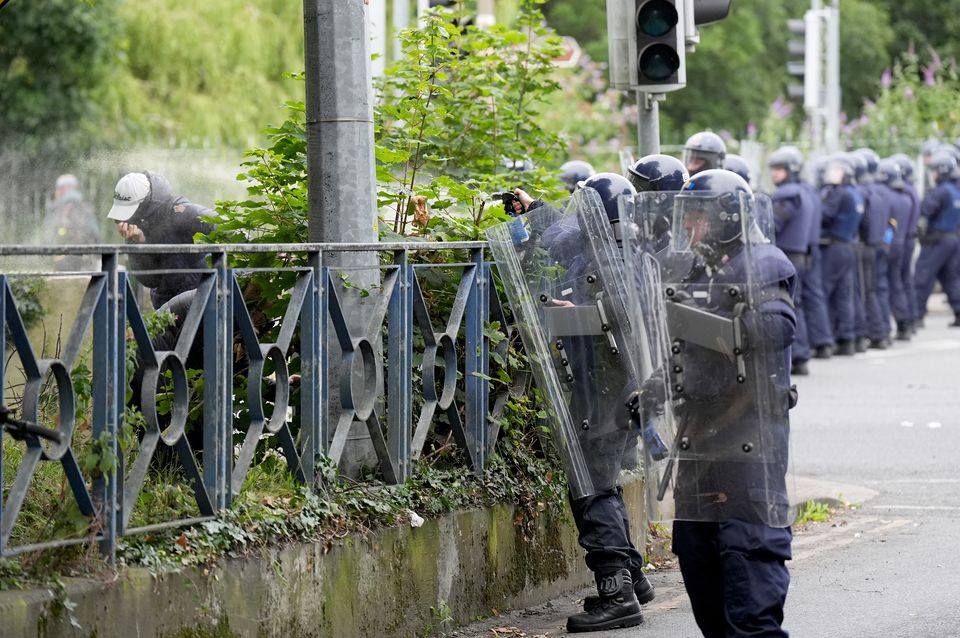The paper, released under the Freedom of Information Act, was prepared by the Department of Justice against the backdrop of an overcrowding crisis and an increase in violence in Irish prisons.
It said there was a case for incapacitant spray and that prison officers in Ireland were “unique” among European jailers in not being allowed to carry “defensive weapons or compliance tools”.
The policy paper was prepared last autumn, with then justice minister Helen McEntee giving the go-ahead for use of incapacitant spray.
The submission suggested a pilot project take place, but that legislation would be needed for the introduction of pepper spray.
It said the State Claims Agency had said the increase in prisoner-on-prisoner assaults and an increased risk of injury to staff justified its introduction.
In the UK, children as young as 15 face being incapacitated with pepper spray after justice secretary Shabana Mahmood authorised its use at young offender institutions
However, Department of Justice officials warned the project could take time. A note from one senior official said: “I’ve spoken to the director general [of Irish Prison Service] about this and she is supportive. The need for legislation means the running of a pilot is some way off.”
Last week, it was reported Justice Minister Jim O’Callaghan would proceed with the plan with an announcement due in the next few weeks.
To enable the change, Mr O’Callaghan is preparing to amend the Firearms Act 1925 and the Prisons Act 2007 through the forthcoming General Scheme of the Criminal Law and Civil Law (Miscellaneous Provisions) Bill 2025. Under current legislation, only gardaí are permitted to use pepper spray.
Gardai public order unit officers deploying pepper spray at protesters at the former site of the Crown Paints factory in Coolock, north Dublin, last July. Photo: Niall Carson/PA
In the UK, children as young as 15 face being incapacitated with pepper spray after justice secretary Shabana Mahmood authorised its use at young offender institutions. The plan there has dismayed prison reformers, who say it will create further divisions between staff and minors in their care.
The State Claims Agency in Ireland — which manages compensation on behalf of the government — advised spray could be used by appropriately trained personnel in the right circumstances.
It said research showed it caused no long-term health effects and that its use by gardaí had not led to any claims for damages despite being deployed over 1,000 times a year.
However, the State Claims Agency said it was not without risk and after it was introduced it could lead to an increase in “use of force incidents”.
The policy paper said: “Where it is deployed too soon or too often this can have a detrimental effect on prisoners’ perceptions of legitimate authority.”
It said the use of spray would not work in every situation and that around 10pc of people would be unaffected and some would become “more rather than less aggressive”.
Justice Minister Jim O’Callaghan
The research also said prisoners would try to prepare for its use against them when planning a violent act.
“Prisoners, in planned violence incidents, will try to protect against it and/or mitigate the impact of the spray,” said the paper.
It said the Irish Prison Service would need to have a significant additional governance procedure for managing incidents. This would include healthcare for staff and prisoners as well as monitoring, debriefing, and secure storage of spray.
It added: “There are definite limitations on its use in certain circumstances: in crowded public areas; on female prisoners; on pregnant prisoners; in cases of passive resistance; on prisoners with mental health issues; on prisoners when at a height.”
An accompanying submission said most jails were operating well above capacity, with growing pressure from prison staff for personal protection.
It detailed how at one stage the female prison in Limerick was at 150pc capacity, the women’s Dóchas centre at 124pc and the male facility in Limerick at 121pc.
“Throughout 2023 and to date in 2024, the Irish Prison Service has been operating above 100pc of overall capacity, reaching as high as 112pc, with certain prisons consistently experiencing overcrowding significantly beyond that,” it said.
In the documents, there was a separate discussion about the use of batons on prison landings with a warning they had the potential to introduce more problems than they would solve.
A report from the State Claims Agency was quoted, which said: “There are a number of known and possible unknown, unintended consequences which could worsen the situation in relation to the risk of staff being assaulted by prisoners.”
#Fears #Irish #prisoners #violent #pepper #spray #jails









